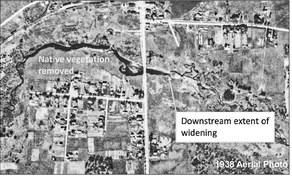Committee says no to joining state climate coalition
By Kevin O’Brien
Marathon County will not be joining a coalition of local governments dedicated to promoting renewable energy and adapting to climate change.
In a sign of how divided the county board is over the issue of alternative energy, members of the Human Resources, Finance and Capital Committee has voted 3-4 against a recommendation to join the Wisconsin Local Government Climate Coalition (WLGCC). Membership in the organization is free, but the county would need to appoint a representative to attend monthly WLGCC meetings.
WLGCC, according to its website, advocates for “clean energy and climate change solutions in Wisconsin” by providing a forum for local units of government to share ideas and collaborate on efforts to become more carbon neutral. The coalition has a total of 28 members, including the cities of Wausau, Stevens Point and Eau Claire, and six counties.
Supervisor John Kroll brought the idea of joining the coalition to the HRFC at its May 7 meeting, arguing that it would be a way for the county to save money on energy costs and deal with the impacts of climate change – such as
See COALITION/ page 9 Coalition
Continued from page 1
the shortening of winter recreation seasons.
Allison Carlson, executive director of WLGCC, spoke to the committee about the origins of the coalition, which was started in 2020 by a small group of local government officials who realized that municipalities and counties could band together to tackle the challenges presented by climate change.
Reading from the coalition’s mission statement, Carlson said WLGCC’s goal is to be a platform for local governments to deal with the changing climate and “ensuring we make the transition to clean energy” while continuing to meet the needs of communities across the state.
Carlson said WGLCC has five main priorities: promoting energy-efficient building construction; “greening the grid” by supporting renewable energy; increasing “transportation resiliency” with public transportation and EV charging stations; implementing no or low-emission land use policies; and encouraging “natural solutions” such as urban forestry.
The coalition has a wide variety of members, and not every municipality or county has the same capacity to enact changes in energy policy, she said.
“We want to meet you where you’re at,” Carlson told supervisors.
One of the key benefits to membership, according to Carlson, is the opportunity to learn about solutions adopted by other units of government and to find out about outside funding available to help increase energy efficiency. WLGCC is currently working on a searchable database for members to access sample policies and other documents related to what communities are doing in Wisconsin.
Kroll said he envisions multiple benefits to joining WLGCC, including the ability to get data from outside sources rather than leaning on county staff to come up with information. He also sees cost-saving potential when it comes to upcoming building projects and ways to improve the county’s zoning code.
“Instead of doing all of this alone, I see it as a way to collaborate with people who are in the same situation we are,” he said.
Supervisor Ann Lemmer, who tried unsuccessfully to form an energy task force last session, said WLGCC could offer ideas for saving on utility costs.
“There are so many places we could go to look for efficiencies,” she said. “That’s why I proposed the task force – to see where the low-hanging fruit is within our government operations.”
Echoing Lemmer’s comments, Kroll noted that a 2016 study by the University of Wisconsin found that Wisconsin spent $14.4 billion on energy that year, and most of that money went out of state because Wisconsin does not produce much of its own energy.
“We want to keep that money here in Marathon County,” he said. “If that’s investing in infrastructure efficiencies, that money stays here in Marathon County instead of being exported.”
Other supervisors, however, were more skeptical about the county becoming a member of a coalition like WLGCC.
Supervisor Scott Poole said he objects to the county joining “what amounts to an issue advocacy group,” regardless of the topic.
“I think it’s appropriate that we consider any recommendations that a group like this has, but we should also be looking for different perspectives and independently consider what’s best for the county,” he said.
Supervisor Jordan Reynolds asked whether the WLGCC advocates for things like wind and solar energy, which has generated a lot of public backlash in the western part of the county.
In response, Carlson denied that WLGCC pushes any specific agenda, and said it’s more of a resource for members to use at their own discretion.
Supervisor Stacey Morache said she had concerns about adding another obligation for county administrator Lance Leonhard, who would have been designated as the county’s representative to the WLGCC. The membership resolution also states that the administrator’s “designee” could represent the county, and in addition, it directs the administrator to appoint a county board member to the WLGCC. Morache, however, said the full county board should be in control.
“We take all different energy initiatives case by case and approve them through the board,” she said. “So, personally, I would be a no on this if it comes to county board.”
On a roll call vote, supervisors Lemmer, Kody Hart and John Robinson voted in favor of a recommendation to join the WLGCC, while supervisors Poole, Reynolds, Gayle Marshall and Kurt Gibbs voted against it.
Before the vote was taken, Lemmer said she was confounded by why the proposal was so controversial, considering that the county recently had to spend thousands of dollars in federal money from the American Rescue Plan Act in order to keep up with unexpected increases in energy costs.
“This is not costing us anything,” she said about joining WLGCC. “I don’t see it as political, but yet it’s being turned into something political, and I’m just baffled.”




